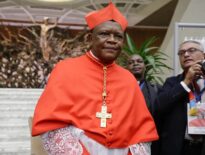Jan 11 (Reuters) – Donald Trump’s civil fraud trial in New York is set to conclude with closing arguments on Thursday, as the state’s attorney general seeks nearly $370 million in penalties from the former U.S. president for overstating his net worth to banks.

The lawsuit by New York Attorney General Letitia James alleges Trump and his associates inflated the value of his assets by billions of dollars to secure better loan terms and other financial benefits for more than a decade.
Trump, the frontrunner for the 2024 Republican presidential nomination, has denied wrongdoing and said the case is a political witch hunt. He has complained that the trial is interfering with his campaign but has used occasional court appearances to rally support with inflammatory remarks to news cameras assembled outside.
The judge overseeing the trial, Justice Arthur Engoron, denied Trump’s bid to deliver his own closing arguments on Wednesday after the former president would not accept ground rules barring him from making a “campaign speech.”
Republican voters in Iowa and New Hampshire will be the first to decide their preferred nominee this month in contests that are seen as key bellwethers for the wider race.
The lawsuit is on of many legal troubles Trump faces as he campaigns to challenge President Joe Biden in the November 2024 election, though none have diminished his commanding lead over rivals.
Engoron presided over the trial in Manhattan and will issue a verdict at a later date without a jury. He found Trump liable for fraud in September, leaving the trial to focus largely on how much money Trump should surrender as ill-gotten gains.
Trump has appealed Engoron’s prior order and is almost certain to appeal any verdict against him, which could delay a final judgment for many months to a year or more.
Trump has chafed at Engoron’s management of the trial from the beginning, when the judge issued a gag order barring him from disparaging court staff. He has been fined $15,000 total for twice violating the order.
Throughout trial, the state’s lawyers sought to show that Trump consistently overvalued many of the towers, golf clubs and other assets that burnished his reputation as a business mogul before he entered politics.
During defiant and meandering testimony in November, Trump defended the valuations of his properties, boasted of his business acumen and accused James and Engoron of being political partisans.
The trial saw a tense face-to-face reunion between Trump and his onetime lawyer and fixer Michael Cohen, who had not seen his former boss in person since their acrimonious break five years ago.
Cohen said Trump directed him to change asset values on his financial statements to arrive at whatever arbitrary net worth he desired.
Trump’s lawyers said Cohen lacked credibility because of his past felony convictions and open animosity toward Trump. That was the basis for one of their several bids for an immediate verdict in their favor, all of which Engoron denied.
Trump’s adult children Donald Jr., Eric and Ivanka Trump also testified, saying they had little or no involvement in preparing their father’s financial statements while running the Trump Organization. All three have denied wrongdoing.
Unlike her brothers, Ivanka Trump is not a defendant.
Trump faces four potential criminal trials this year. He has been charged in Washington and Georgia for his attempts to overturn his 2020 election loss, in Florida for his handling of classified documents, and in New York for hush money he paid to a porn star.
Trump has pleaded not guilty in all those cases.
Reporting by Jack Queen in New York; Editing by Noeleen Walder and Daniel Wallis





